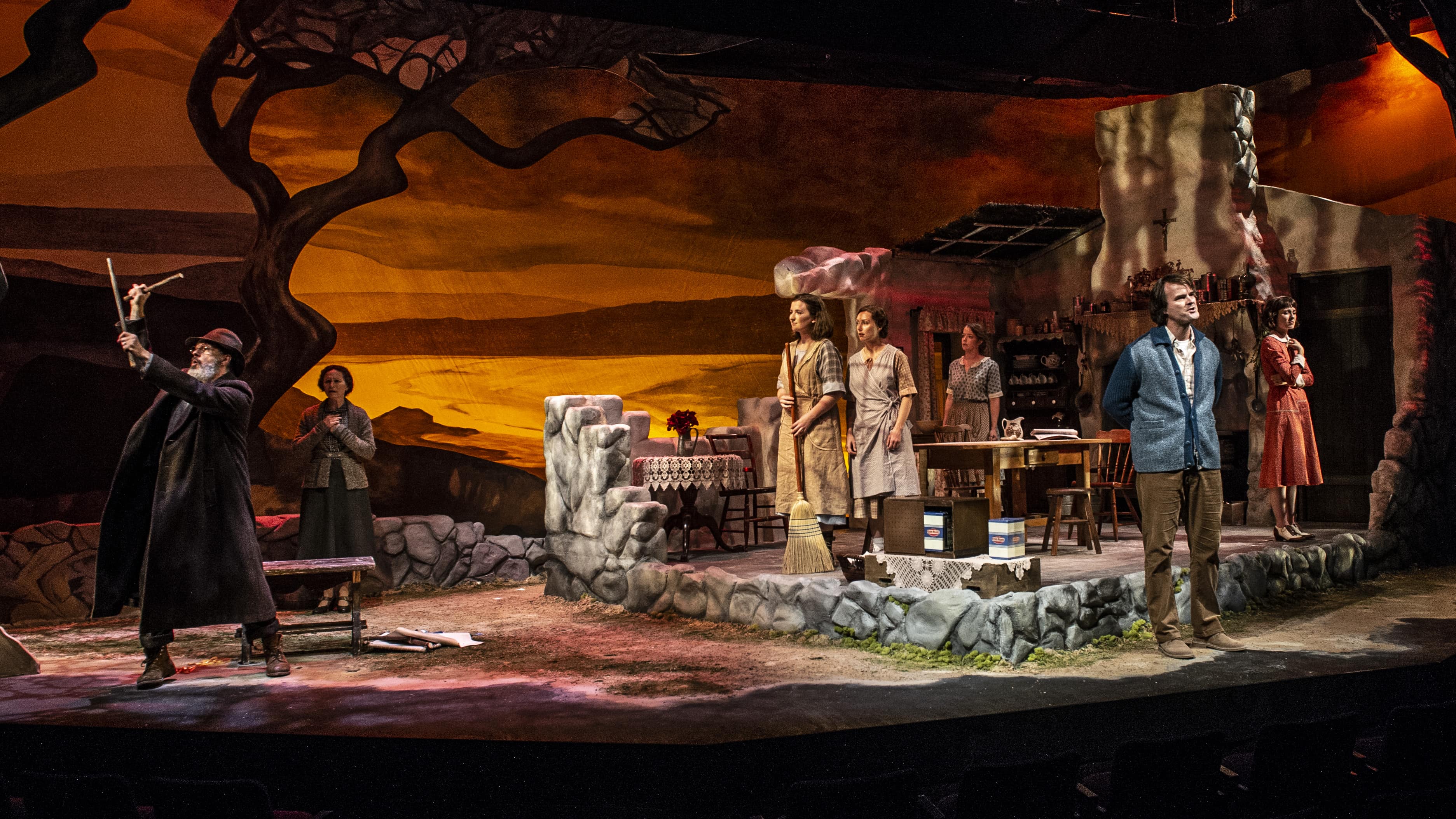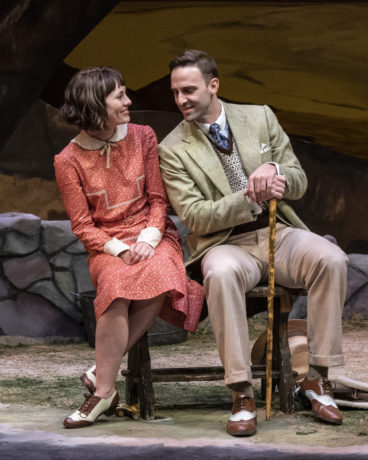True magic happens not when we’re convinced that an illusion is true, but when we realize that it can’t be so yet still refuse to believe it isn’t. Such a spell is cast over the audience at Everyman Theatre from the moment it enters the house to observe Yu-Hsuan Chen’s enchanting set for Brian Friel’s Dancing at Lughnasa. Sinuous cut-outs, so beautifully stylized we immediately accept them as windswept trees, surround a lovingly detailed facsimile of an Irish cottage whose walls and roof, we surmise, have been removed to permit us to see inside – but which, we’re already certain, are still “there” in reality.

There’s a very real danger in believing what we know to be impossible, however, or even in suspending disbelief in it. When the play’s narrator, Michael (Tim Getman), finally steps through that invisible wall just as he utters the word “illusory,” it’s enough to take our breath away, challenging as it does our very notions of what is authentic, not just on Everyman’s stage but on the stage of the world as well. Moreover, it reminds us that all the other characters in the show – Michael’s parents, uncle, and four aunts – remain in the thrall of various pretty lies (and a few not-so-pretty ones) that cannot be escaped without hitting a metaphorical brick wall.
Michael is a man approaching middle age, looking back on the Celtic festival of Lughnasa in the waning summer of 1936, when he was seven years old. Lughnasa honors the youthful god Lugh, a savior of the Irish people whose presence is now sorely lacking in a country facing the double whammy of the Great Depression and the delayed impact of the Industrial Revolution. Like the mother of Lugh in the legend, Michael’s female caretakers are working themselves to death to pave the way for his future, but they memorably succumb, albeit only momentarily, to the enticements of the festival – and their own repressed longings – by joining in its celebrations, which have been known to include manic dancing, family reunions, and even trial marriages.
Friel has the adult Michael mostly stand on the sidelines of the action and deliver the lines of the child Michael, while the other characters react to an empty space where the actual boy would have been. In Getman’s sensitive hands, we soon get the sense not only that the grown Michael is mourning his lost childhood, but also that his younger self was prematurely deprived of his youth, forced by the family’s often dire circumstances and his own peevish nature to grow up too quickly, despite his aunts’ best attempts to keep him happily young and innocent – efforts, ironically, that were often unwelcomed by him at the time.
One may be reminded of the scene in Our Town where Emily’s ghost returns to relive her twelfth birthday, only to despair that “it all goes so fast,” and to realize that her relatives barely looked at her even when she was visible to them. Friel’s device goes a step further, implicating Michael as well in the failure to live in the moment, and leading us to ponder whether any of us would be any more present in a retrospective of our lives.
Fortunately, under the primal yet precisely choreographed direction of Amber Paige McGinnis, every actor at Everyman lives every moment of this play to the fullest, thereby making their characters’ ultimate failures seem all the more tragic. Megan Anderson portrays the most mischievous aunt, Maggie, whose silly pranks and riddles thinly disguise genuine wisdom, just as her droll demeanor barely conceals the pain of youthful promise slipping through her fingers. Bari Hochwald, as the devout and domineering but essentially good-hearted Aunt Kate, makes plain that the dubious dogmas she preaches are as child’s play compared to the untruths she tells herself.
Annie Grier embodies Aunt Agnes as a woman often swept into the background by society and even her own family, but whose quiet desperation and broken but still-beating heart are palpable to anyone who cares to notice. In what threatens to be the tasteless role of the developmentally disabled aunt, Rose, Labhaoise Magee blooms with disarming passion and prickliness. And Bruce Randolph Nelson brings profound sympathy and keen insight to the even more problematic part of Uncle Jack, an erstwhile African missionary who could easily be dismissed as a pedophile, but who proves, even in the midst of encroaching dementia, to be the most honest and open-minded person onstage, if not in the entire theater.

But the most poignant figures of all are Michael’s parents, Chris (Katie Kleiger) and Gerry (Danny Gavigan). Unwed and evidently doomed never to be otherwise, they maintain a bond of affection that is stronger than many a marriage, for all the good it does them. We’re told that Chris’s “whole face alters when she’s happy” – a rare occurrence, to be sure, but one radiantly confirmed by Kleiger when the opportunity arises. And Gavigan invests Gerry with irresistible charm even when he’s failing to measure up, since we can see those failings disappoint him at least as much as they do the other people he’s letting down.
These two are well aware – and we can’t deny – that they would be disastrous for each other in a committed relationship, just as they have been appallingly neglectful of their son all along. And yet, they can’t help being drawn back together over and over again, much as we – and, we perceive, Michael, too, even after he should know better – can’t help rooting for them to do so. Again, we may find ourselves recalling another great memory play, The Glass Menagerie, in which the visit by a gentleman caller only ends up being destructive for everyone involved, but which still can be treasured among the ruins for bringing momentary joy to lives that can expect no better.
As Aunt Maggie warns us after an especially dazzling display of sleight-of-hand, “Imagination: one quick glimpse is all you get.” You have until October 7 to glimpse what is already guaranteed to be one of the most magical and memorable productions of Baltimore’s new theater season.
Running Time: Two hours and 30 minutes, including one intermission.
Dancing at Lughnasa plays through October 7, 2018, at Everyman Theatre, 315 W. Fayette Street, in Baltimore, MD. For tickets, call the box office at (410) 752-2208, or purchase them online.




